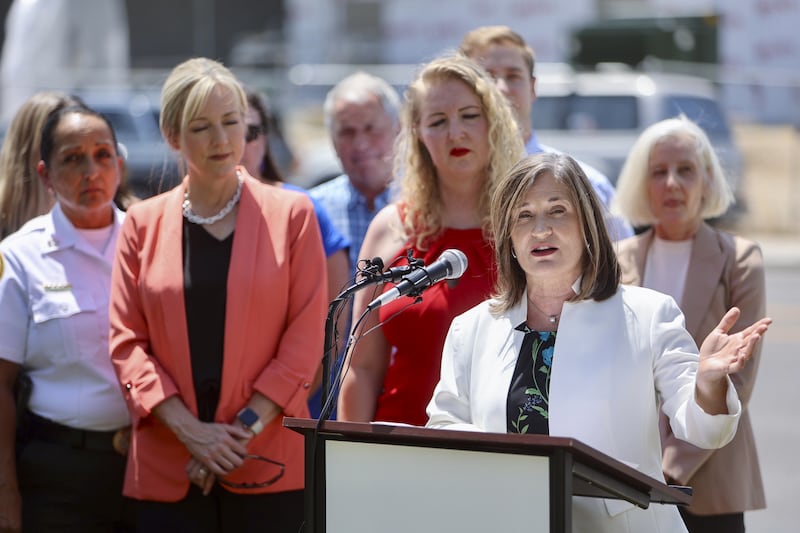Salt Lake County Mayor Jenny Wilson announced a “game-changing” initiative aimed at curbing homelessness and reforming the criminal justice system in the county Friday afternoon.
She made the announcement outside the Salt Lake County Sheriff's Office, across the street from where construction crews were working on what will soon be a new mental health receiving center for individuals in crisis; "an alternative to jail for those experiencing crisis," as Wilson described it.
"This facility is truly game-changing," she said. "The construction right behind us represents significant progress in our human services, homelessness and criminal justice system, yet we know that many gaps remain."
District Attorney Sim Gill said county jails often serve as the de facto largest mental health facilities around the country and praised the facility as an investment that would result in better outcomes for people while reducing the burden on taxpayers.
Along with the expected mental health center, Wilson announced a five-year human services plan designed to ensure "homelessness in Salt Lake County becomes brief, rare and nonrecurring."
Several of the key proposals in the plan focus on reducing homelessness and drug use, including:
- Adding 1,000 units of housing with space for people suffering from mental illness and homelessness.
- Improving law enforcement training to respond to mental health crises.
- Using the new mental health receiving center as an alternative to jail.
- Adding 10 additional Drug Enforcement Agency officers.
- Increasing facilities for transitional housing and step-down facilities to help inmates reenter the community after incarceration.
"We know that this one is going to change," Wilson said of the current plan, "but it is a benchmark, it's a road map. ... This is our road map; it will change over the years, but it gives us confidence that we can tackle this community concern."

Wilson said the plan is the result of more than a year of research and planning, including several working groups that convened weekly to identify weaknesses in the county's current system of caring for the homeless.
The proposal comes after the county identified several challenges, including a lack of affordable housing for unsheltered individuals. The county estimates there are about 1,000 people living unsheltered in the county: 300 who require intensive mental health treatment and housing support, 300 who require permanent housing and case management, and 400 who have varying needs of housing support ranging from permanent supportive housing to rental subsidies.
Utah Gov. Spencer Cox was asked about Wilson's proposal during his monthly news conference Friday morning, and while he didn't give away any specifics of the plan, he was optimistic about its prospects and praised Wilson for putting it together. He said the various government entities that work to address homelessness — from the state, county and city levels — have been "working closer together than ever before — at least as long as I've been involved."
"I'm very supportive, I think it will make a difference," he said. "She's definitely headed in the right direction on this one."
Laurie Stringham, a member of the Salt Lake County Council, echoed Cox's comments and described the county's effort as one that transcends ideology and geography.
"This is not a simple problem in any way, shape or form," she said. "It's an issue that we have to approach from every single angle, and we need the government, we need private, we need business, we need churches, we need community organizations and we need everyday citizens involved."
Wilson stressed that the changes to policing and responding to mental health concerns are not meant to reduce accountability for those who commit crimes. The initiative includes a planned "justice and accountability center" to provide additional resources to those facing housing instability after being released from jail or prison.
"This is a great mix of compassion and accountability," said Aimee Winder Newton, a Salt Lake County Council member.
The county plans to fund the project through a combination of Medicaid funds, opioid settlement funds, grants, state and federal resources, and philanthropic contributions. All told, it carries an estimated price tag of $42.29 million, with $11.53 million going to housing operations, $18.62 million to law enforcement and criminal justice reform and $12.03 million to filling “systemic gaps” through workforce supports and mental health support in jail, along with other interventions.

